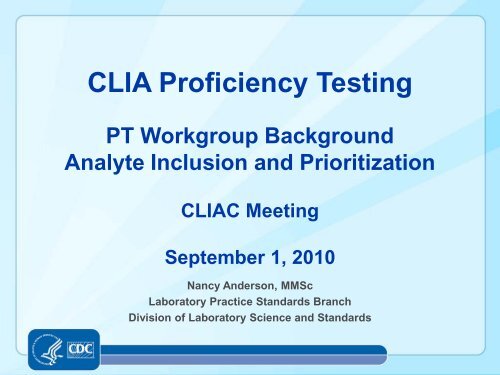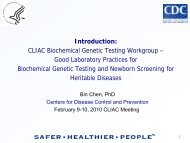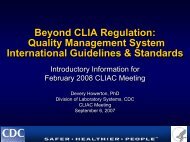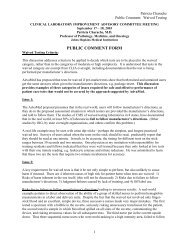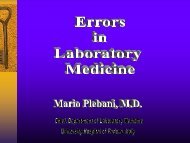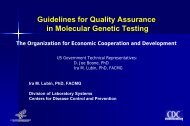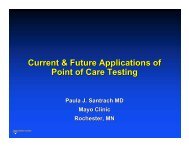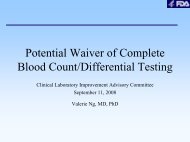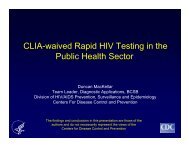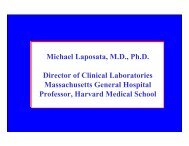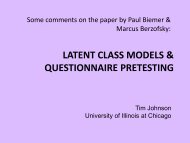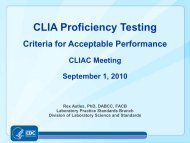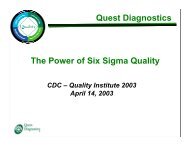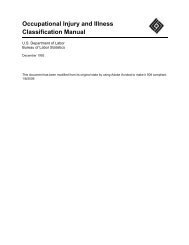CLIA Proficiency Testing
CLIA Proficiency Testing
CLIA Proficiency Testing
You also want an ePaper? Increase the reach of your titles
YUMPU automatically turns print PDFs into web optimized ePapers that Google loves.
<strong>CLIA</strong> <strong>Proficiency</strong> <strong>Testing</strong><br />
PT Workgroup Background<br />
Analyte Inclusion and Prioritization<br />
<strong>CLIA</strong>C Meeting<br />
September 1, 2010<br />
Nancy Anderson, MMSc<br />
Laboratory Practice Standards Branch<br />
Division of Laboratory Science and Standards
Workgroup Background<br />
<strong>CLIA</strong>C recommendation: Form a PT workgroup to<br />
examine and provide suggestions concerning the<br />
need for revisions to the <strong>CLIA</strong> PT requirements<br />
CMS and CDC organized the workgroup to include<br />
stakeholders in the proficiency testing process<br />
• Laboratory experts<br />
• Accreditation organizations<br />
• State surveyors<br />
• PT program officials<br />
2
Workgroup Members<br />
WORKGROUP CHAIR<br />
Nichols, James H., PhD, DABCC, FACB<br />
MICROBIOLOGY CO-CHAIR<br />
Hall, Gerri, PhD, D(ABMM)<br />
MEMBERS<br />
Breazeale, Ruthi, MMSc, MT(ASCP)<br />
Brophy, Michael A., MS, MT(ASCP), FACHE<br />
Connolly, Kathryn, MT(ASCP), CQA(ASQ)<br />
Delacruz, John Michael, MS, MT(ASCP)<br />
Edson, Daniel, MS, MT(ASCP)<br />
Hill, Barbara, MT(ASCP)<br />
Janzen, Verlin K., MT(ASCP), MD<br />
Jerris, Robert C., PhD, D(ABMM)<br />
Johns, Cynthia, MSA, MLS(ASCP) CM SH CM<br />
Laubenthal, Connie, MS, MLS CM<br />
Lehr, Fran, MS, MT(ASCP)<br />
Mitchell, Barbara, MS, MT(ASCP)<br />
Palicki, Linda, MT(ASCP)<br />
EX OFFICIO MEMBERS<br />
Carey, Roberta B., PhD (CDC)<br />
Gutierrez, Alberto, PhD (FDA)<br />
Yost, Judith, MA, MT(ASCP) (CMS)<br />
Passiment, Elissa, EdM, CLS(NCA)<br />
Prygrosky, Bernadine, MT(ASCP), MBA<br />
Rej, Robert, PhD<br />
Robinson-Dunn, Barbara, PhD, D(ABMM)<br />
Serafy, Nicholas T., Jr.<br />
Sullivan, Judy, MS, MT(ASCP), SBB<br />
Thompson, Carol J., MT(ASCP)<br />
Vance, Gail, MD<br />
Walker, Susan, MLS(ASCP), MA(HEd)<br />
Wilson, Steven A., Col, USAF, BSC<br />
Winn-Deen, Emily S., PhD<br />
Yamamoto, Gary<br />
Zachary, Andrea A., PhD, D(ABHI)<br />
3
Workgroup Charge and Objectives<br />
Charge:<br />
Provide input to <strong>CLIA</strong>C for their consideration in making<br />
recommendations to HHS regarding the need for revisions to<br />
the <strong>CLIA</strong> requirements for proficiency testing (PT) as specified<br />
in subparts H and I of the regulations.<br />
Objectives:<br />
Provide input to <strong>CLIA</strong>C regarding changes to subparts H and I<br />
of the <strong>CLIA</strong> regulations:<br />
• Updating the list of <strong>CLIA</strong>-regulated analytes<br />
• Revising the criteria for acceptable performance (grading<br />
criteria), including target values and acceptable limits for<br />
current and proposed analytes<br />
• Changes to specialties or subspecialties that do not have<br />
regulated analytes, including microbiology<br />
• Clarification of the requirements that address PT referral<br />
• Other changes needed to update and improve required PT<br />
4
Statutory PT Requirements<br />
<strong>CLIA</strong> law – Section 353(f)(3)<br />
• Requires that a laboratory participate in proficiency<br />
testing (PT) for each examination or procedure for<br />
which PT can reasonably be developed<br />
• Standards shall include uniform criteria for acceptable<br />
performance based on:<br />
• Available technology<br />
• Clinical relevance of the laboratory examination or<br />
procedure<br />
• Standards shall include a system for grading PT<br />
5
Regulatory Requirements for<br />
Laboratories<br />
42 CFR part 493, Subpart H - requirements<br />
for laboratory participation in PT for<br />
nonwaived testing<br />
• For each regulated analyte or specialty without<br />
analytes, laboratories must:<br />
• Enroll in an approved PT program<br />
• Analyze 5 challenges per event<br />
• Obtain 80% for satisfactory score (most analytes)<br />
• Perform satisfactorily on 2 out of 3 testing events<br />
6
Regulatory Requirements for<br />
PT Program Approval<br />
42 CFR part 493, Subpart I - requirements for<br />
proficiency testing program approval and<br />
annual reapproval<br />
• Specifies the regulated analytes or tests for which PT<br />
must be performed, their criteria for acceptable<br />
performance, and grading/scoring criteria<br />
• For each regulated analyte, annual PT must include 5<br />
challenges, 3 times (events) per year<br />
7
Nonwaived <strong>Testing</strong><br />
for which PT is Required<br />
<strong>CLIA</strong> PT requirements (including regulated<br />
analytes) were included in the final <strong>CLIA</strong> rule<br />
published January 28, 1992<br />
Required PT for all laboratories (including<br />
previously unregulated) was implemented<br />
January 1, 1994<br />
Regulated analytes and their criteria for<br />
acceptable performance have not changed<br />
since that time<br />
8
Current Regulated Analytes<br />
Diagnostic Immunology<br />
• Syphilis Serology<br />
• General Immunology – 15 analytes<br />
Chemistry<br />
• Routine Chemistry – 25 analytes<br />
• Endocrinology – 7 analytes<br />
• Toxicology – 15 analytes<br />
Hematology – 10 analytes<br />
Immunohematology – 5 analytes<br />
9
Current PT Requirements -<br />
Nonwaived Microbiology <strong>Testing</strong><br />
Does not include regulated analytes<br />
Required PT is specified in Subpart I by<br />
“types of services offered by laboratories”<br />
for each subspecialty<br />
• Laboratory types (levels) are structured based on test<br />
procedures performed and extent to which<br />
microorganisms are identified (i.e. genus, species)<br />
• Lists of example organisms are provided for each<br />
subspecialty<br />
5 samples must be tested per PT event for<br />
each subspecialty of patient testing<br />
10
Considerations for Revising<br />
the List of Regulated Analytes<br />
Considerations need to reflect statutory and<br />
regulatory requirements for having:<br />
• Sufficient quantities of stable and reproducible PT<br />
samples<br />
• Ability to establish uniform criteria for acceptable<br />
performance for that analyte or test<br />
A process is needed to assess potential<br />
factors to identify analytes or tests to add as<br />
regulated<br />
Access to appropriate data is essential to<br />
making determinations regarding analyte<br />
inclusion and prioritization<br />
11
Previous <strong>CLIA</strong>C Deliberations<br />
Regarding Adding Analytes<br />
<strong>CLIA</strong>C has considered PT issues on several<br />
occasions in the past<br />
Their suggestions for potential criteria for<br />
adding regulated analytes have included:<br />
• Impact on patient care/clinical significance of test<br />
• <strong>Testing</strong> problems with specific analytes<br />
• Cost/benefit analyses for laboratories<br />
They concluded more data are needed to<br />
facilitate future discussions on PT<br />
12
Data and Information Provided for<br />
Consideration<br />
CMS PT enrollment data<br />
Test frequency rankings for different<br />
laboratory types<br />
• Six-hospital system<br />
• Large reference laboratories<br />
• Small hospital/physician office laboratories<br />
• Health maintenance organization/point-of-care sites<br />
Medicare reimbursement data<br />
PT program counts for analyte offerings<br />
13


